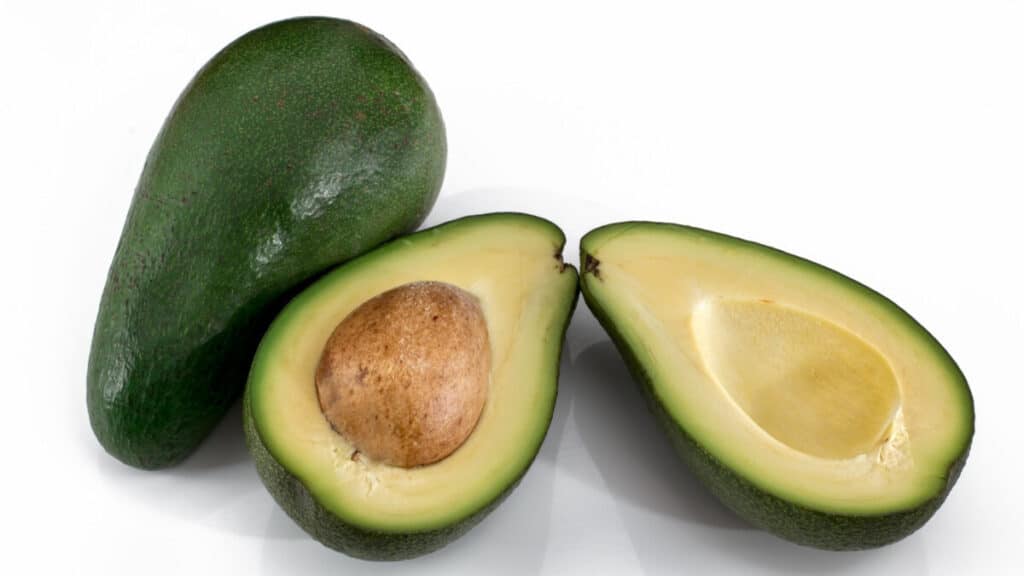Skip To Section
Can Horses Eat Avocados?
No, horses can not eat avocado. The fatty acids in avocado form a substance called persin that is toxic to horses and can cause colic, arrhythmia, trouble breathing, neurological issues, edema, and even death.
Avocados are delicious, versatile, and exploding in popularity for their health benefits. Since horses enjoy a nice veggie treat, horse owners might think that it’s a good idea to share tasty avocado with your horse, but avocados are actually toxic to them! Even small amounts of this soft, savory fruit can cause distress in your equine friend.

Risks Of Horses Eating Avocado
There are quite a few risks when it comes to horses ingesting avocado. Let’s take a closer look at avocados and how they are toxic to horses.
What Is An Avocado?
Avocado is a fleshy, green fruit that grows in the southernmost parts of the US and in Mexico. They grow on an avocado tree and are known for their buttery texture and abundance of beneficial fatty acids.
Only the fruit of the avocado tree is eaten by humans, but the risk of avocado leaves being mixed in with lawn clippings that are eaten by horses can pose an issue, even if the horse never eats the fruit itself.
Why Can’t Horses Have Avocado?
Horses tolerate most vegetables well, so why is avocado so problematic for them?
Avocados, from the leaves to the fruit, are toxic because of a substance they contain called persin.
According to HorseDVM, large amounts of avocado, around 30g leaves per kg of the horse’s body weight can be fatal for a normal-sized horse.
Even a small amount of avocado fruit or tree is still incredibly dangerous for horses, so even insignificant amounts of ingestion should be taken seriously.
Symptoms Of Avocado Toxicity In Horses
The severity of your horse’s symptoms will depend on the amount of avocado that they ingested. Some of the less serious symptoms can be treated by a veterinarian.
Symptoms of avocado toxicity include, but are not limited to:
- Colic- Stomach pain and other gastrointestinal issues
- Arrhythmia-Irregular heartbeat
- Ataxia- Irregular or clumsy gait
- Respiratory distress- Trouble breathing
- Neurological dysfunction- Issues caused by dysfunction of the horse’s brain
- Edema- A buildup of fluids
If a horse consumes a significant amount of avocado, death can occur. Fluid can build up around the heart and lungs of the horses, leading to cardiac and respiratory distress, and in severe cases, rapid death.
The rapid onset and severity of avocado poisoning mean that owners need to be vigilant in keeping avocado trees out of the grazing pasture or anywhere else a horse could get to them.
Is Avocado Safe For Horses?
No amount of avocado, whether it’s the fruit, pit, leaves, bark, or root, is safe for horses to consume.
The highest concentration of persin is in the fruit, but all parts of the tree contain a fair amount, and it takes very little avocado or avocado tree to poison a horse
Can Avocados Kill Horses?
When eaten, avocado can absolutely kill horses. The goes for all parts of the tree, and even small amounts can prove fatal.
There is no safe amount of avocado for horses. Avoid this savory green fruit at all costs if you have grazing horses.
What To Do If Your Horse Has Eaten An Avocado?
The best thing to do to help your horse is to avoid them eating avocado in the first place.
If it’s too late for prevention, try to ascertain the amount of avocado your horse has eaten and separate him from the source while you call the vet.
If your horse has eaten an avocado, always call your vet as soon as possible. Never try to treat on your own!
Since avocado can cause cardiac dysfunction, try your best to keep your horse calm while you are waiting for help to arrive to avoid a heart attack. Persin causes fluid to build up around the heart and lungs and increases the risk of a cardiac or respiratory emergency.
If your horse has not eaten too much and your veterinarian arrives in time, they can usually treat avocado toxicity.
The 3 most common treatments for avocado poisoning are:
- Flushing of the stomach
- Activated Charcoal
- Liquid paraffin
Once your vet has treated your horse, just keep a close eye on them over the next few days so you can catch any late symptoms that may crop up.
Conclusion
While avocado may be an ideal treat for us, it’s safer to stick to the rare sugar cube as a treat for your horse.
Horses cannot eat avocado, it’s very toxic to them.
All parts of the avocado tree are toxic to horses, and the symptoms range from mild colic to death.
If your horse eats avocado, call your vet immediately.
Related Posts
- Can horses eat apples?
- Can horses eat bananas?
- Can horses eat grapes?
- Can horses eat oranges?
- Can horses eat peaches?
- Can horses eat pears?
- Can horses eat strawberries?
- Can horses eat watermelon?
- What do horses eat?
